Meet Sloppy Jones co-creators as they spill the tea on collaborating as a threesome, overcoming challenges and keeping the dream alive. From choosing to have all-female mentorship, to bringing queer comedy to the mainstream, to exploring their own life experiences, they dish it all.
Sloppy Jones is a dark comedy series that follows a group of queer twenty-somethings working at a dive bar, dealing with the stresses of everyday life like paying rent, annoying customers, and who to hook-up with next. The norm gets rudely interrupted when their low-life boss Frank goes missing. Now enter his melodramatic cougar ex-wife Deb to solve the case and save the Sloppy Jones Grill. With everyone a suspect and no one safe, that’s where we start off the series.
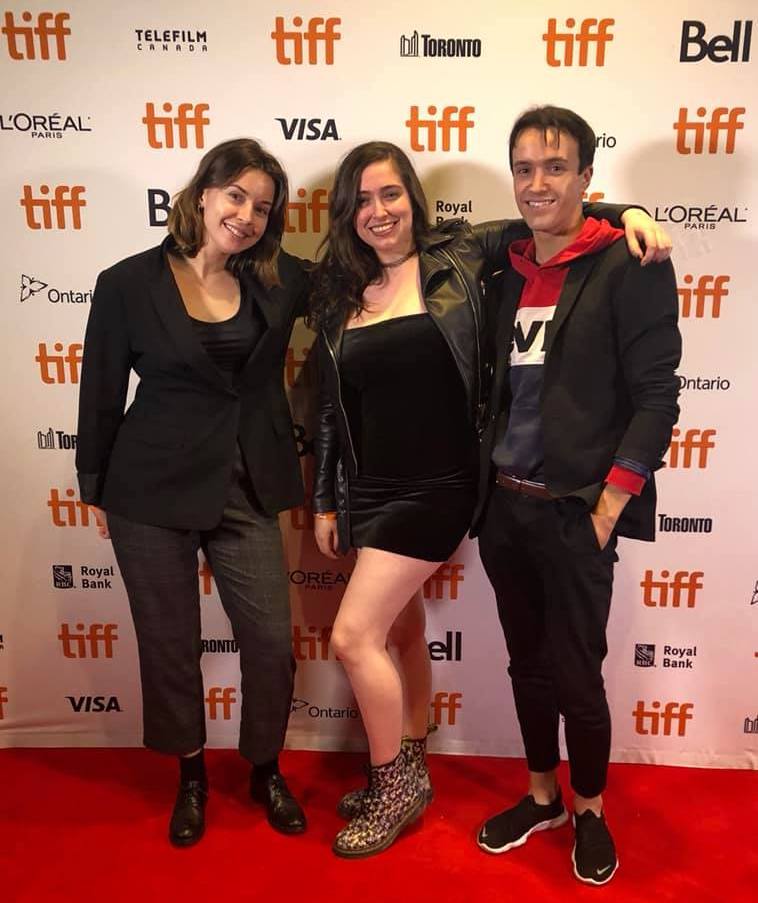
Meet the Creators of Sloppy Jones
JAMIE HART
Jamie Hart is an actor, writer, creator. Passionate about feminist and LGBT representation and escapism through writing, she believes that everyone deserves to see themselves in all film, literary, or television genres.
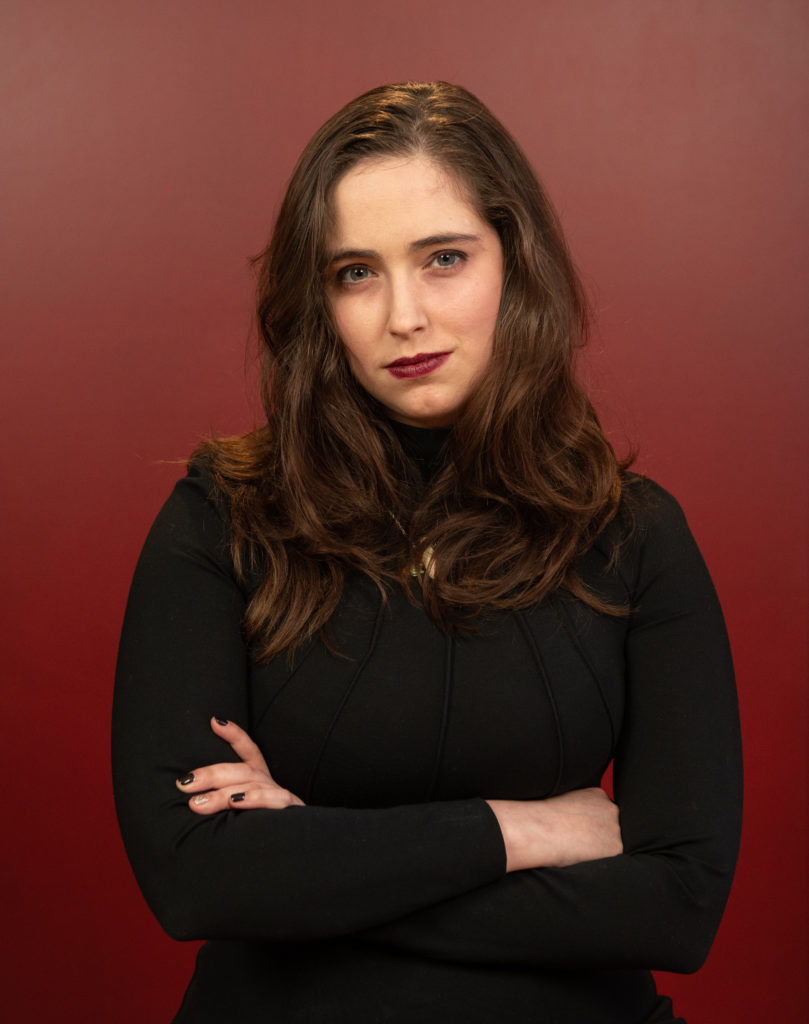
As a seasoned bartender, she comes into this project armed with a library of authentic comedic moments and experiences to inform her writing.
Jamie is starring in the role of Harper Shelly.
JONATHAN MACDONALD
Theatre vet, Jonathan Neil Alexander began acting at 8 years old. From small-town Nova Scotia beginnings, he’s now studied and worked professionally, both writing and performing, in New York, Montreal, California, and now Toronto.
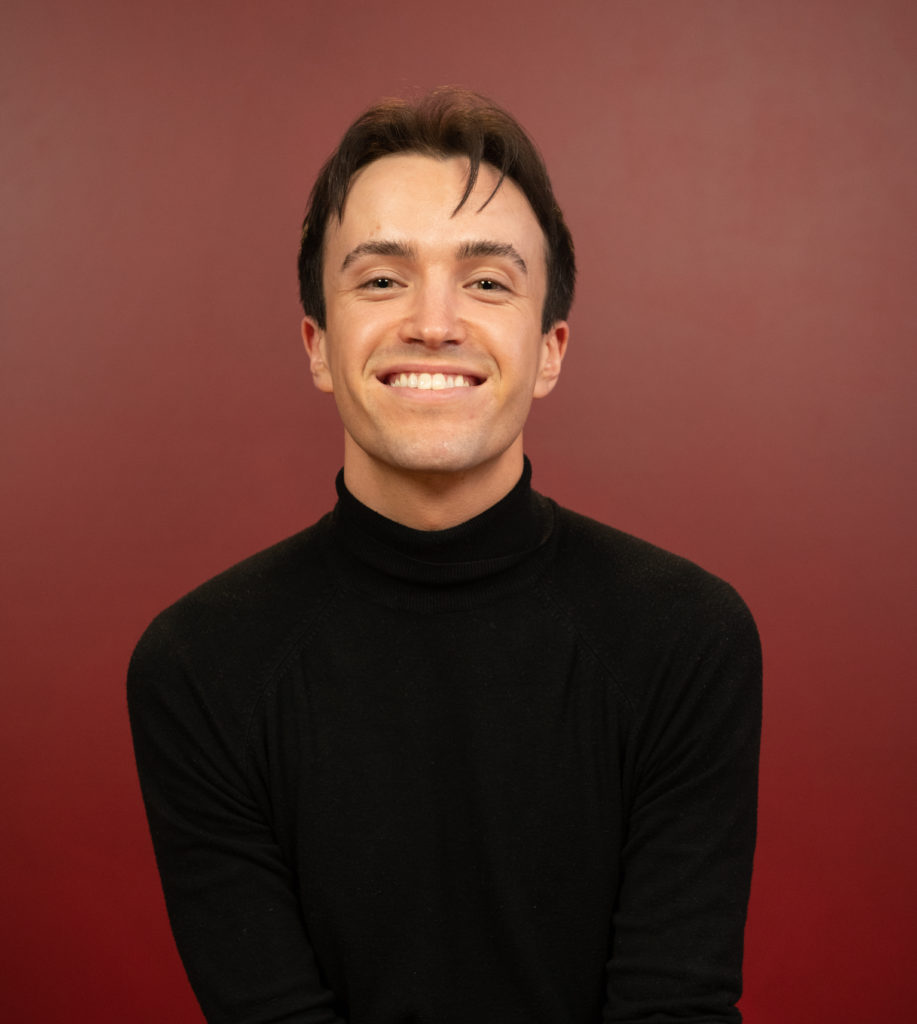
Jonathan also comes with fine-dining restaurant experience and is “over the moon” to be involved in this project and to continue telling diverse entertaining relevant stories.
Jonathan’s starring in the role of Thomas Collins
SOPHIE NATION
Sophie Nation is a Toronto-based writer, director, and actor. She is passionate about exploring new narratives and LGBTQ, Mental health, and feminist representation.
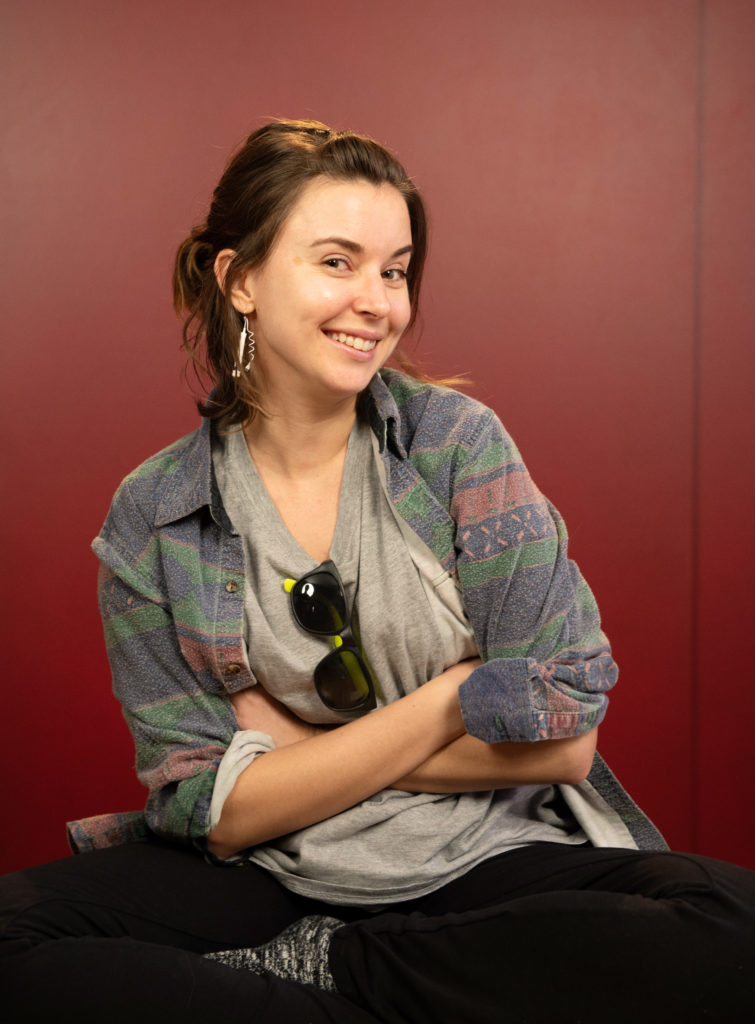
She started acting and creating short films at an early age. She studied theatre in university and has performed in NYC, Montreal and Toronto. She has worked as a server in several restaurants over the last few years.
Sophie’s starring in the role of Rory Woods.
Q & A with the Creators of Sloppy Jones
We caught up with the trio to chat about the ups and downs of creating a web series and how they have managed to stay friends first throughout the process.
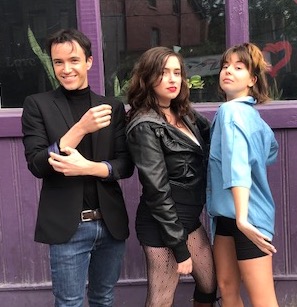
How did you three meet and decide to create a web series together?
Jamie: Sophie and I have known each other since we were little kids. We worked on a show together called Sophie’s Kids Camp. Sophie was the star and I was a backup dancer. Sophie had crimped hair and charisma for days. I was a little clumsy, but my outfit was great.
Then we both attended Rosedale School of the Arts and studied theater.
The summer after my first year of university Sophie got me a job as a tour guide. She did boat tours and I did bus tours. Jonathan and Sophie already knew each other from theatre school, and he was the bartender on her boat.
The tour guides had to wear these hideous red polo shirts and run around in the blazing sun getting super sweaty— Jonathan always looked amazingly cool in his shaded bar and cute bespoke outfit.
We actually have to give credit to our producer, Susan Nation for the series idea. She called us and it was something to the affect of “You all work in restaurants. You all have these fun messy stories. You all want to write and act. I have some development money for a young fresh restaurant comedy with a twist. I think you should write it and act in it. Let’s just do this. What are we waiting for?” So she hired us to write a show. Susie is great for that. She’ll just make things go.
Jonathan: Sophie and I met in acting school. It was love at first sight. She made fun of me almost immediately and we bonded over my love of self-deprecation. Jamie and I met working on a Doritos commercial for Hop To It Productions. We have since bonded over our mutual cringe over that commercial. We were all brought together over the course of a couple of months as writers to create a restaurant based series. We added some fun plot lines and we got to work with some incredible mentors on writing and comedy.
Sophie: I’ve known Jamie since I was a kid! We ended up going to the same high school and actually were in our high school’s theatre company together. We were in a play called “A Black Comedy”. I played a drunk grandma and Jamie played a spoiled daddy’s girl who called her father Daddypegs. We also worked together on some Hop To It projects performing and then at a sightseeing company. I was the lady of the lake and she was in knee-high doc marten boots on the kinky boots bus.
I met Jonathan at theatre school! We had a class called “When Writers Play” together and it was love at first sight. The first night we hung out we went to Thai Express and made a Miley Cyrus video. Then we had a joint birthday party two months later and wore matching blue sequin outfits. When Jonathan moved to Toronto, he also came to work with us at the sightseeing company.
Sue, being very aware of our wacky experiences working in hospitality asked us if we were interested in writing a series about working in a restaurant and we said “hell yeah!” We were brainstorming ideas and one thing led to another and Sloppy Jones came out of the wood work.
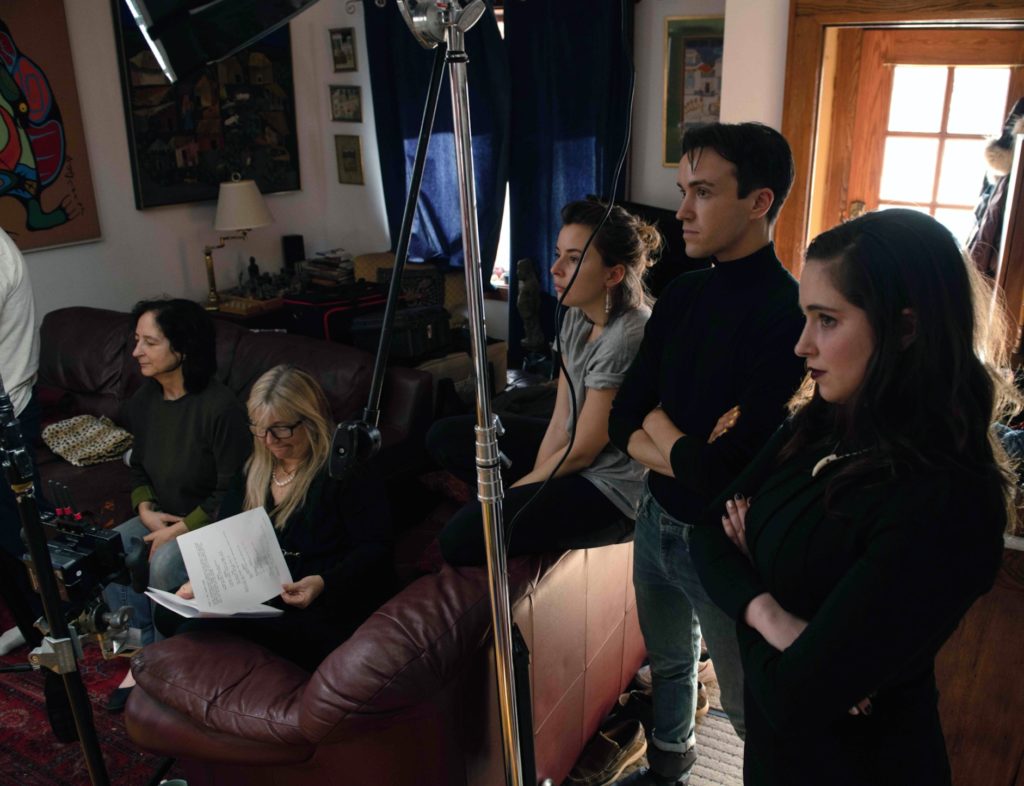
What inspired the storyline of Sloppy Jones? Were there any shows you took inspiration from?
Jamie: Obviously a big part of it was our lived experiences. I’ve been bartending for years. Aside from that Broad City, Schitt’s Creek and Scream Queens are all things we looked at for tone.
As for the murder itself—we’ve talked this over so much it’s hard to keep it straight—I think it actually started as a joke. Somebody was like “Frank is dead. LOL” and then we were like “well why not? Why wouldn’t he be dead? Let’s just kill him. Let’s just kill a man.” You know, typical millennial chatter.
Sophie: Our lived experiences were the starting point, but then we really took what inspired us and excited us and went with it. We really wanted to create this chaotic and dreamy world with tons of absurd moments and the people also happen to be queer. Their queerness is not what causes their struggles and is actually just normalized. I worked at a restaurant with a lot of queer staff and it was such an awesome, inclusive space. A bunch of those people are still some of my closest friends and it’s actually how I met Jeigh Madjus, who plays Antoni. Another big inspiration was the aesthetic of The True Love Café in Toronto at Sherbourne and Dundas. It’s closed down now sadly, but we started writing the show imagining it took place there. There’s so much going on there and it really has a unique, but sad story behind it. I read actual Yelp reviews to get a sense of this kitschy rundown place with endless quirks and stories. Our inspiration is constantly shifting and where the story started is not where it is now which is really cool.
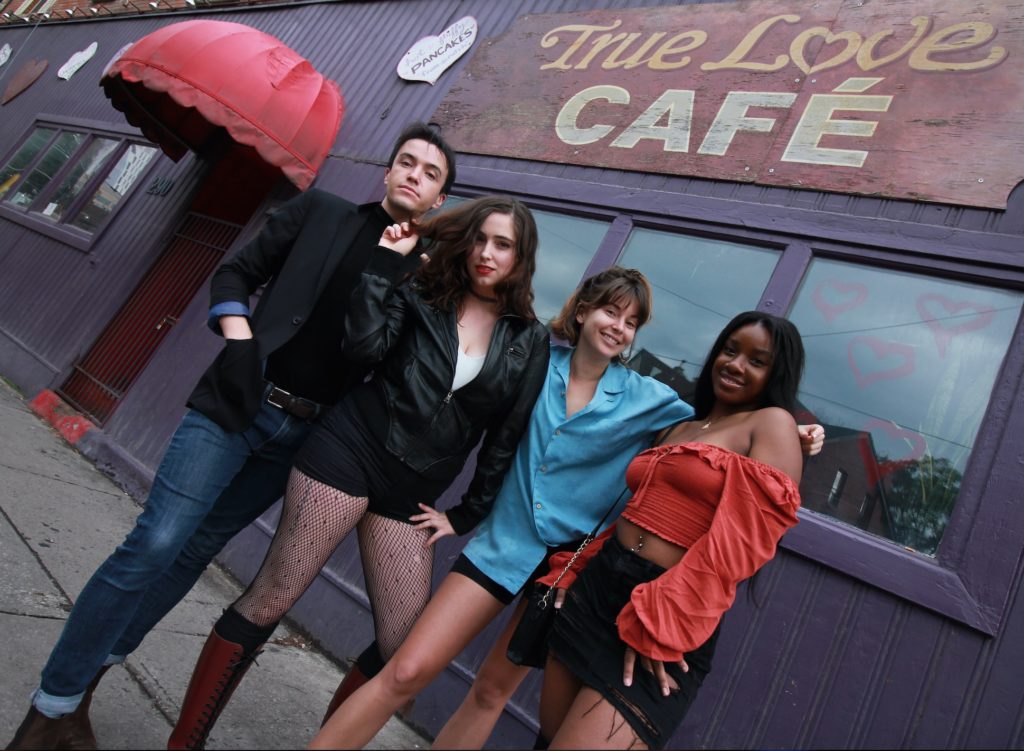
I think when you’re working at a restaurant, it can kind of feel like you are removed from the real world. You are there for long hours and your co-workers really become like a dysfunctional family with all sorts of dynamic and relationships and drama. We felt that if the place was sort of wacky and out of this time period, that feeling of closeness would be even more heightened. Pinterest was also a huge source of inspiration. We started Pinterest boards immediately. Shows like Twin Peaks and campy horror movies like Scream and I Know What You Did Last Summer inspired us a lot. 80’s dive bars. The bright neon and the dilapidated, dreamy vibes.
Jonathan: The story definitely evolved over time. We at first were looking to make a fairly accurate but heightened and funny portrayal of working at a restaurant as a twenty-something with a bad boss struggling to pay rent. A bit of Vanderpump Rules, Schitt’s Creek and The Office. We worked on the creative and tone with our amazing mentor Amanda Walsh who had worked on Schitt’s Creek and with Judy Croon from Second City on comedy. It evolved into a story about the lives of the characters. We became totally enamored by the presence and excitement of cougar Deborah and her relationship with Frank who had gone missing. We did workshops with Jill Golick on creating unique characters with strengths, flaws and goals. She helped us shape their dynamic and that inform quite a bit of the murder storyline. No spoilers, I promise.
How did you get it off the ground?
Jamie: Susie again! She’s the Queen of opening doors. Plus a lot of hard work.
Jonathan: We were brought onto the project while it was still under another name YOLO Bistro, apparently inspired by a project Susie had worked on years ago called Cupid’s Cafe with a sleazy manager called Frank. Susan Nation is a producing queen and can get anything off the ground. It all started with her, and Carrie Cutforth.
Sophie: We wrote up a pitch package and applied for funding, then revised and revised and eventually got it! It was really hard work but so worth it.
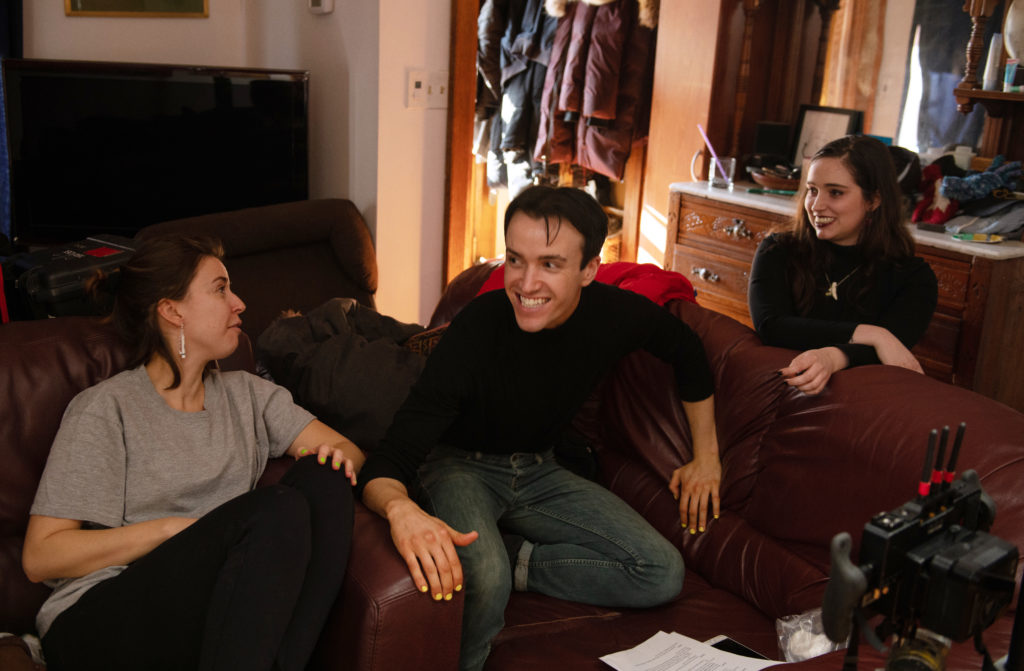
Any advice for people thinking about working with friends on a project? How did you manage to keep the peace?
Jonathan: Find what works best for you. There’s a bit of trial and error. For example, I personally like compartmentalizing time. If I’m at work, I work and act through that lens, as colleagues, and creators. When office hours are done, it’s back to being friends and talking about boys or girls. I think trust and respect play a huge role in the dynamic too. It’s important, friends or not, to be able to trust everyone to throw out ideas all the time. Listening is also key. Basically playground rules, play nice.
Sophie: Set boundaries and a “code of conduct” off the bat, especially when working with family and friends. I think the biggest source of stress can be miscommunication/ lack of communication. Schedule regular meeting times in person if possible. Be positive. Make sure you are all on board with what is going on and major decisions are made as a team. Recognize each other’s strengths.
Jamie: Important things are emails or in person discussions—not instant messages. It can be hard when you are all juggling work schedules and struggling to keep up with each other or cutting each other off. Be respectful. Major changes have to be run by the group before they are applied to the project.
The biggest thing is bringing up any issues you have right away in a constructive manner instead of letting them fester and then having a blow-up. There really hasn’t been much unscripted drama in the writer’s room though. We like each other.
What did working with others teach you about yourself?
Jamie: That I’m a neat freak about documents and note-taking.
Jonathan: I think any time you work on a project you learn something about yourself, where you deliver your strengths, and where that best suits the project. I don’t want to speak for anyone else, but this has definitely been a space where learning was cultivated and encouraged. Susan Nation taught us a lot and brought in some great mentors, Amanda Walsh, Jill Golick, Judy Croon, and a couple of others who really gave such valuable insight into their world and working styles. I just felt lucky to be able to forage that information. Very much big chipmunk energy.
Sophie: That my perfectionism can be crippling and is something I’ve really had to work through. Working with a supportive team is important because it pushes you to create despite doubts and anxiety.
Had any of you written a comedy before? If not, how did you prepare?
Jonathan: I studied at the Groundlings and Second City when I was living in LA. I think that really helped create a basis of language for me, and structure. And to not be so precious with ideas.
Jamie: I have written a comedy before. It was a play called Clue (based on the board game) that I wrote with my friend Emily Cullen when we were running the theatre company at our high school. Not to brag, but it was pretty great for a first try. Other than that my genre is definitely fantasy. I wrote a web series called Spell Bent and filmed the pilot in 2018 (Sophie is in it).
We had Judy Croon from Second City come in and work on our script with us—she just filled it with comedic buttons. It was great. She had us do stand-up comedy exercises while we were getting the hang of it. She’s lovely by the way. She’s so patient and encouraging.
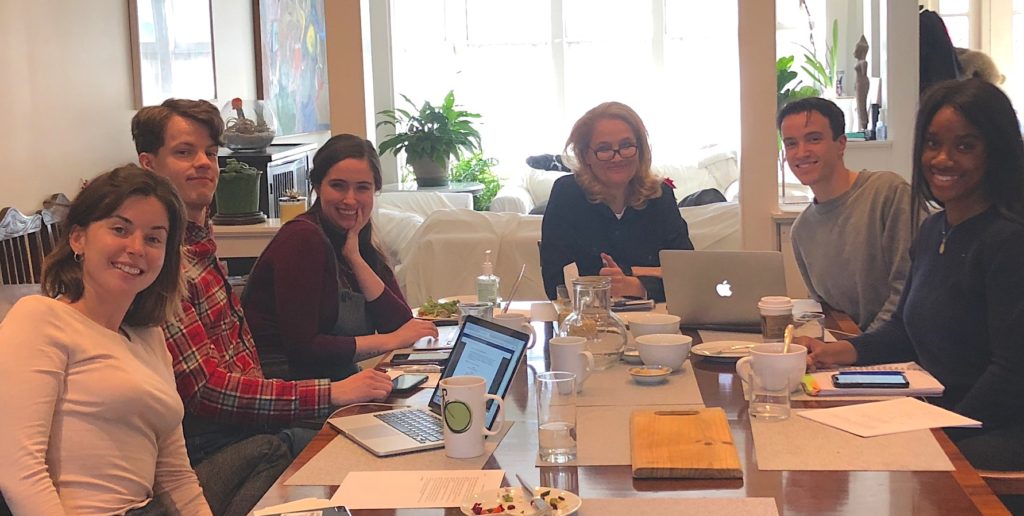
Sophie: My sister and I wrote and performed in comedy short films all through school. I did some courses and summer camps at Second City in Toronto. Then Jonathan and I were writing a comedy web series in university actually! We never ended up shooting it because we both had other things going on and also school was a lot. Other than that, much of my writing has been quite dark and moody, but I also love comedy and improv.
Amanda Walsh understands comedy and was really helpful talking tone and characters and plots. Then Judy Croon unleashed the standup comic in each of us. It was an interesting realization for us that our mundane honest experiences and thoughts blown up could be what worked like in The Office, which I love. It helped us get in touch with each character and specify the type of comedy we liked and voices.
Were there any setbacks and if so, how did you remain inspired and driven to create Sloppy Jones?
Jamie: The shoot was pushed back twice due to scheduling conflicts from key members. Honestly, it was probably for the best, because the teaser script just kept getting better over time. Plus if we’d had our original shoot date, we wouldn’t have been able to work with our incredible director and mentor Winnifred Jong. She’s fantastic. She has such a great eye.
It’s easy to stay driven when your job is literally hanging out with your friends and laughing at each other’s jokes. Also, there were a lot of Drew Barrymore impressions. If you ever have writer’s block I strongly recommend running around your house re-enacting the opening scene from Scream. It’s hilarious and anxiety-reducing—but your neighbours might hate you.
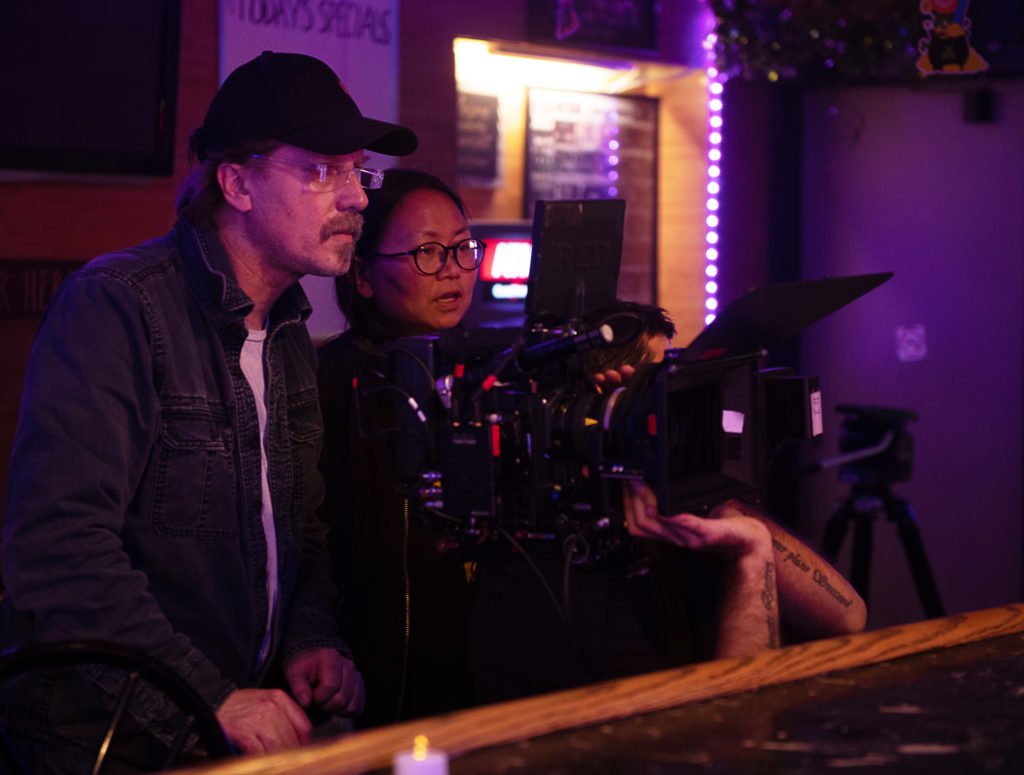
Sophie: I think the biggest setbacks ended up actually being blessings in disguise! Our shoot dates were pushed back twice due to scheduling conflicts and it ended up being great because in that time, we were able to get comedic icon Linda Kash on board as the lead Deb, and Winnifred Jong on board as our director and they elevated the whole project. They came with such a wealth of talent, experience and knowledge. Winnie was able to help us lock down an amazing location, re-structure our format for the sizzle, and really just bring our vision to life. I think the drive just came from being passionate about telling this story and caring about this world and the characters living in it. When you really invest emotionally in a project, it’s easier to stay driven.
Jonathan: There are always setbacks, but if you approach it expecting them, they don’t hurt as much and sometimes they can even be positive, and you’re able to continue driving the ideas.
Why do you think there aren’t more queer stories being created and shared?
Jonathan: The million-dollar question. I think with marginalized groups, lack of representation is part and parcel. Not being in the position to be actualized through a story is a fucking shame. Don’t get me wrong, many successful creators, shows, and roles have paved the way for us today from Will and Grace to Modern Family to Schitt’s Creek to Ru Paul’s Drag Race to Carmilla. Now I’m really hopeful about the future of inclusion and think that with all the streamers and platforms available, we are entering a golden age of story-telling, exposure and choice. A large number of people in the world are queer, and they want to see themselves not just as tokens, but as leads.
Jamie: I don’t think there’s necessarily a lack of queer stories or content creators. There’s lot’s of great independent content out there like Carmilla, or Alice Isn’t Dead. I think the problem is really airtime. You have to look at who is funding the big projects, you know? Who controls the purse and what are their personal beliefs and biases?
People love to say “write it yourself” when a marginalized person calls for representation, but I don’t think that’s the point. The problem isn’t that nothing’s being written. The problem is that there are advertising agencies, broadcasters and major production companies out there that are owned by or watched by people with biases. People don’t want to “lose their audience.” I don’t have any interest in “sanitizing” things up for homophobes. Nobody on this team does. We value authenticity.
Sophie: I think they definitely exist and are being created, but it’s really difficult to finance a project. Big production offices and broadcasters probably view queer stories as “risky” because mainstream TV and Film are so hetero normative. Even though there are so many queer people desperate to see themselves represented. It just takes a few projects succeeding to shift that bias. Plus now, subscription-based VOD platforms can afford to create and test high quality content for different diverse audiences and genres as they don’t rely on advertising.
Name your favourite moment and most challenging moment so far that you faced with Sloppy Jones?
Sophie: My favorite moment was the entire day on set. It was surreal seeing what we had written come to life. It was so cool to see what each actor brought to the character that we hadn’t even thought of. Jeigh had literally made his own sweater by sewing ostrich feathers to it, because he felt Antoni needed it. It made the character pop so much and was an iconic detail. Watching Linda Kash act was also insane. She is so incredible. I couldn’t imagine anyone else playing Deb. She scared the shit out of me in her ending monologue (which was the point of it).
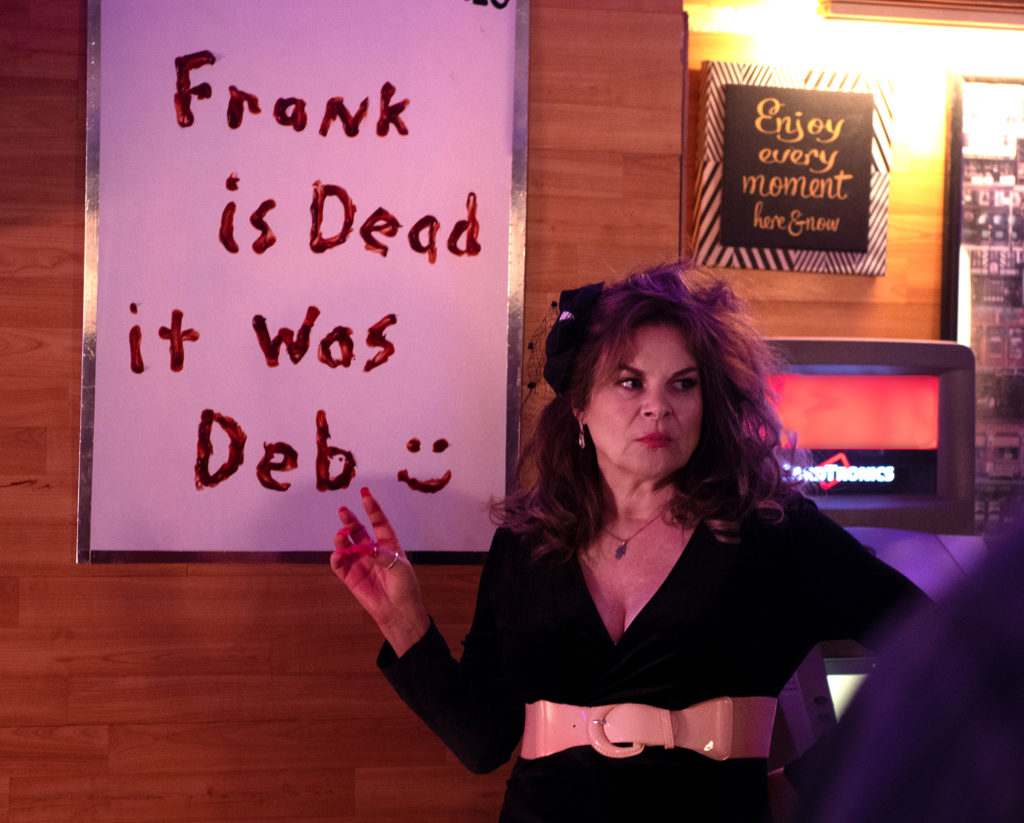
Jonathan: My favourite moment is also my most challenging. It was the process of fledging out the world and seeing the characters and relationships develop in our scripts. It was really fun for me to see a clearer and clearer picture as we continued working. This was also the most challenging. It requires a lot of rewrites and edits, and ‘killing the kittens’. This writing process is pretty all-encompassing and enduring, but it’s also incredibly rewarding. Those two ideas, for me, tend to go hand in hand.
Jamie: My favourite moment was definitely watching Linda Kash absolutely slay her closing monologue in the two-minute sizzle. She’s incredible. Linda leaned into the three of us right before the first take and whispered, “what do you want from this? Is she controlled? Is she crazy?” The first time Linda screamed “devil” on set, the whole cast jumped. Every take was totally new. We literally had to stop and applaud her when she wrapped.
I think the most challenging thing has been adjusting to working in isolation. We used to all sit in a room together and edit our scripts as a unit. It’s been a major adjustment switching to video calls and notes on Word Documents.
Who are your role models and inspirations?
Sophie: Amanda Walsh, Winnifred Jong, Linda Kash and Jill Gollick. Four queens who really helped us and are uniquely amazing.
Jamie: 100% Amanda Walsh. She’s so cool and so sweet. I loved her as Suzie Borton on Dirk Gently’s Holistic Detective Agency and Schitt’s Creek is figurative comedic gold. When she came in as a creative mentor there was a lot of embarrassing shrieking in the writer’s room.
And Jill Golick. The woman knows mystery. She has written the most insane murders, but she’s also so funny and so willing to just follow a story thread. When she came in as a mentor she definitely kicked our asses into gear (over snacks!). I love her work. She’s such a gift. We continue to attend her Pendemic Writing Workshops every Wednesday.
Jonathan: As cheesy as it is, I hunt for it all over the place. When I was working at this one particular restaurant and kind of hated it, I had one rule when commuting in the morning. It was my job to fall in love with a moment. Any single moment, whether it be how a kid holds her mom’s hand on the subway, or a lawyer belly laughs on the phone, it was my job to search for it.
Where do you see the show going in the future?
Jonathan: I could see the show working well in a couple of different formats or streaming services. I think as long as the people we wrote it for are able to see it, be entertained, and care about the world, we’ve done our job.
Jamie: 10 seasons and a movie, baby!
Sophie: 11 seasons and a spin-off. 😉
What are you doing to promote SJ?
Jamie: You can follow us on Instagram and Facebook! Our handle is @sloppyjonesshow on every platform. We go Live on Instagram with our talk show Sloppy Hour every Tuesday at 6:30 pm. Two cast members call into the show for cocktails, gossip, and games. You can subscribe to us on YouTube Channel as well if you want to see skits and behind the scenes footage!
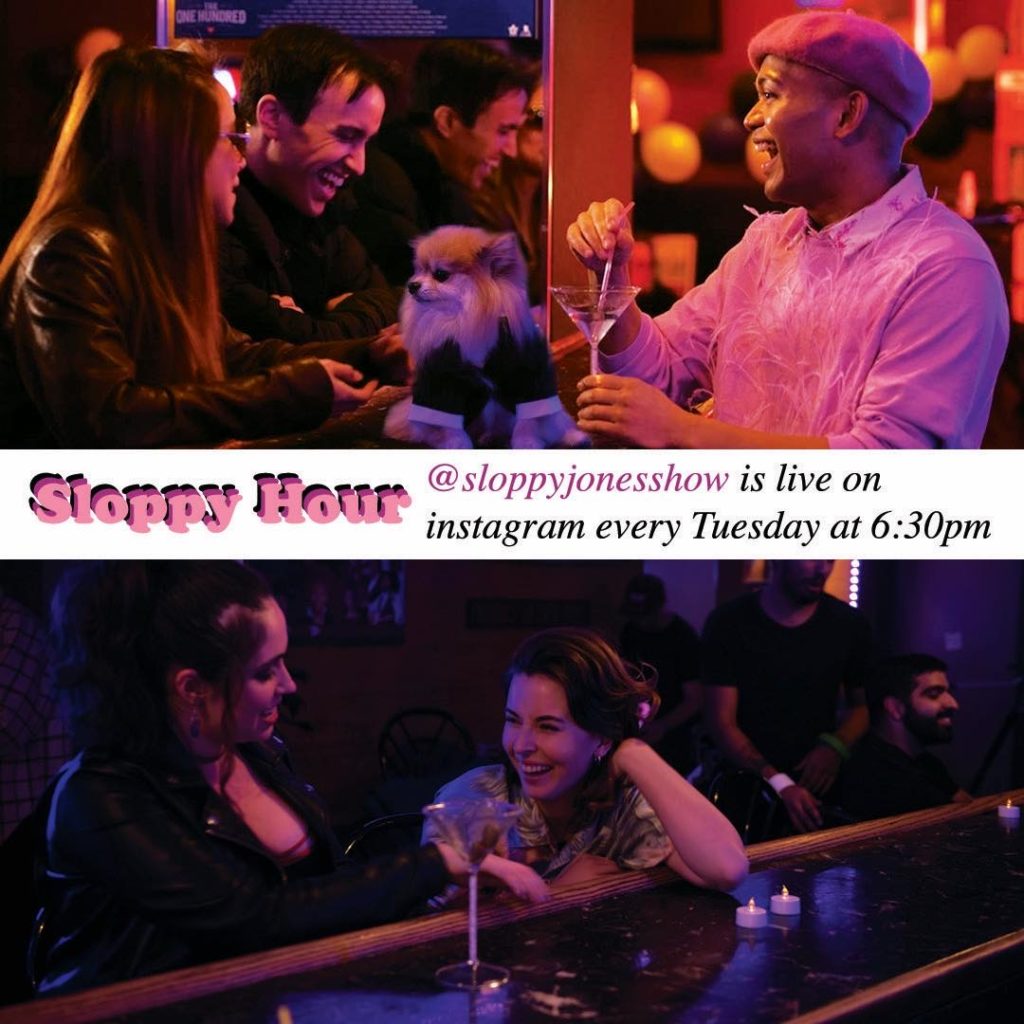
Jonathan: We drink, gossip, talk shop with our collaborators, creators, and actors on the show. Youtube, Facebook, Twitter, and eventually Tik Tok. That’s my baby. I live for Tik Tok.
Sophie: It’s a good time!
For more from the Sloppy Jones cast and crew, check out our behind the scenes post HERE

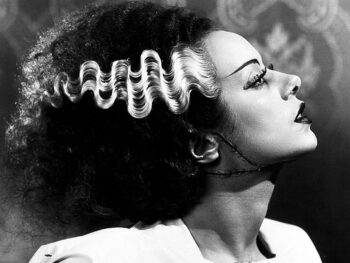
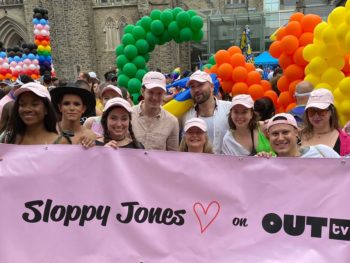
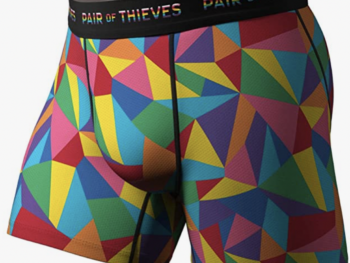

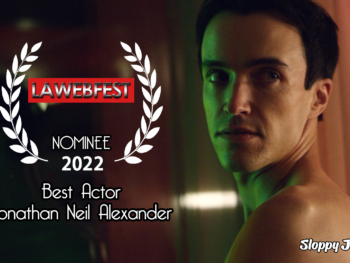
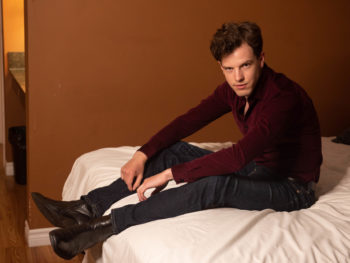
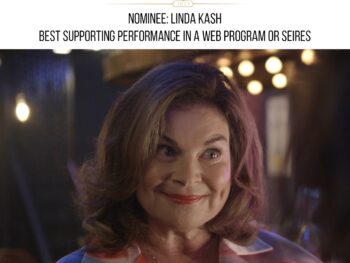
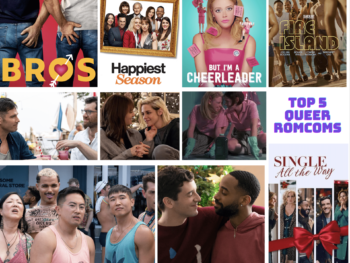
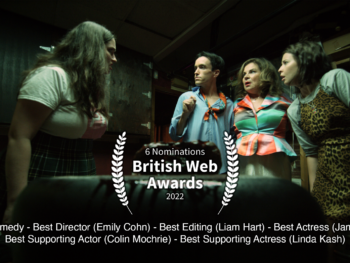


Leave a Reply